As solar array and battery storage debate heats up, Whately backs municipal zoning bill
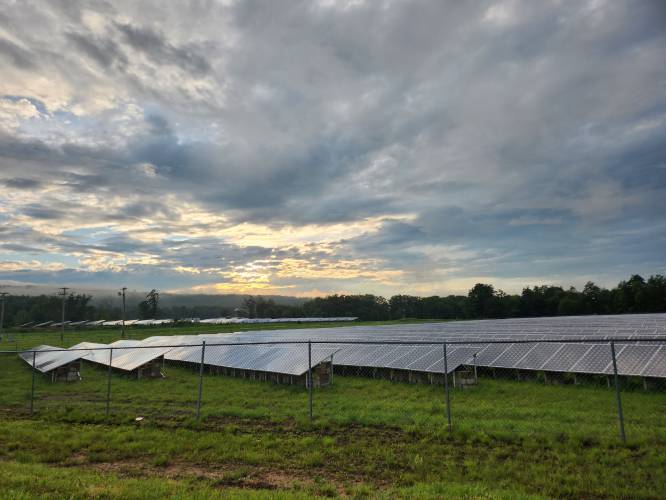
A field of solar panels off Daniel Shays Highway (Route 202) in Orange. Joining several neighboring communities, Whately’s Select Board has signaled its support to write a letter to the Legislature advocating for legislation that could allow municipalities more control over solar energy facilities. STAFF FILE PHOTO
| Published: 01-23-2024 10:24 AM |
WHATELY — Joining several neighboring communities in the Pioneer Valley, Whately’s Select Board has signaled its support to write a letter to the Legislature advocating for legislation that could allow municipalities more control over solar energy facilities.
At the request of the Planning Board, the Select Board recently voted to send a letter to lawmakers in support of S.1319/H.2082, which is called “An Act Regarding Municipal Zoning Powers” and seeks to remove a sentence from Massachusetts General Law Chapter 40A, Section 3 relating to bylaws that “prohibit or unreasonably regulate” the installation of solar energy systems. The bill was introduced by state Sen. Jacob Oliveira, D-Ludlow, and is co-sponsored by Sen. Jo Comerford, D-Northampton.
The sentence was added to the law in 1985 and became a central piece in a 2022 state Supreme Judicial Court case, Tracer Lane II Realty LLC v. City of Waltham, where the court ruled Waltham had unreasonably regulated solar projects because it only allowed solar systems in the city’s industrial zones, which encompass only 1% to 2% of the city’s area. This widespread prohibition, the court ruled, “restricts rather than promotes the legislative goal of promoting solar energy” and is impermissible under the law “in the absence of a reasonable basis grounded in public health, safety or welfare,” according to the court’s ruling.
“What this bill would do is restore the local siting control to what we believed we had before and, I believe, what the Legislature intended,” Whately Planning Board member Judy Markland told the Select Board. “Unlike most communities, Whately chose to make solar eligible in almost all of our zoning districts. … I doubt now whether those size limits [in our bylaws] would be enforceable.”
Markland also shared the Planning Board’s concerns that battery storage facilities may fall under this interpretation of state law. In urging the Select Board to show the town’s support, the Planning Board sent a letter explaining the town adopted a model solar bylaw exempting facilities generating fewer than 10 kilowatts in 2011, but the Tracer Lane case could possibly invalidate those laws.
“Since that ruling, there has been a great deal of uncertainty over what types of zoning restrictions towns might impose,” the letter, signed by Planning Board Chair Brant Cheikes, states. “We feel we are especially vulnerable to accusations of ‘unreasonable regulation’ by project developers, and in fact have faced such allegations even prior to the Tracer Lane ruling.”
The town’s bylaws are also “silent” on stand-alone battery storage systems, which the board had interpreted to mean those types of facilities are prohibited in the community. However, the Planning Board said it believes that is a position “that seems no longer tenable,” which is a concern as those types of facilities are now being proposed in Franklin County, with the most notable example being the 105-megawatt facility planned for Wendell.
“Large solar facilities are the only industrial use [that] has an exemption from local siting control,” the Planning Board’s letter states. “We don’t believe that such an exemption was intended when the law was passed and urge the Select Board to support its repeal.”
Article continues after...
Yesterday's Most Read Articles
 More than 130 arrested at pro-Palestinian protest at UMass
More than 130 arrested at pro-Palestinian protest at UMass
 Public gets a look at progress on Northampton Resilience Hub
Public gets a look at progress on Northampton Resilience Hub
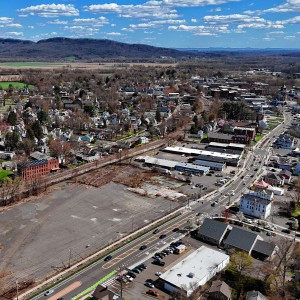 Northampton bans auto dealerships near downtown; zone change won’t affect Volvo operation on King Street
Northampton bans auto dealerships near downtown; zone change won’t affect Volvo operation on King Street
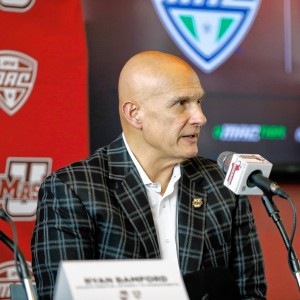 UMass basketball: Bryant forward Daniel Rivera to be Minutemen’s first transfer of the offseason
UMass basketball: Bryant forward Daniel Rivera to be Minutemen’s first transfer of the offseason
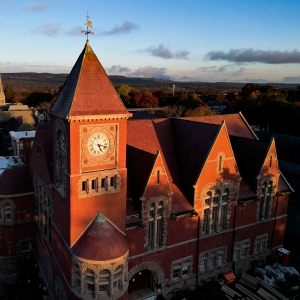 Town manager’s plan shorts Amherst Regional Schools’ budget
Town manager’s plan shorts Amherst Regional Schools’ budget
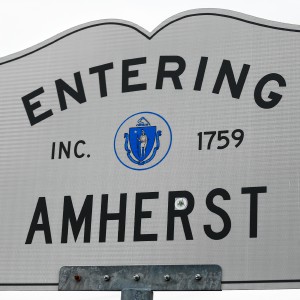 Police respond to alcohol-fueled incidents in Amherst
Police respond to alcohol-fueled incidents in Amherst
After a brief discussion, the Select Board voted to approve sending a letter in support of the proposed legislation. Whately will join Buckland, Wendell, Shutesbury and Pelham in the list of municipalities expressing support.
Chris Larabee can be reached at clarabee@recorder.com or 413-930-4081.

 State Senate budget funds free community college for all
State Senate budget funds free community college for all ‘We can just be who we are’: Thousands show support for LGBTQ community at Hampshire Pride
‘We can just be who we are’: Thousands show support for LGBTQ community at Hampshire Pride Doors open at Tilton Library’s temporary home at South Deerfield Congregational Church
Doors open at Tilton Library’s temporary home at South Deerfield Congregational Church Area property deed transfers, May 2
Area property deed transfers, May 2
